Prospects For Cancer Prevention

The CANCERactive charity held their inaugural National Cancer Prevention Conference at Central Hall, Westminster, on 17th November 2005. A gathering approaching 500 cancer sufferers, advocates, medical practitioners and supporters of the charity witnessed a fascinating day jam-packed with speeches from experts who covered virtually every discipline used in cancer prevention.
This conference was a laudable initiative by CANCERactive - to get many interested parties in the same place at the same time and establish some mutual conclusions on cancer prevention. As the founder of the charity - Chris Woollams - showed in his opening speech, cancer rates have virtually doubled in the last 30 years, and are expected to double again in the next 20. Something has to be done to stop this or the NHS will go bust, a huge chunk of our GDP will be frittered away on drugs and we will all be wondering if our own dose of cancer is just around the corner. Chris introduced the conference with the words ’No one thinks about cancer prevention until a few days after they are diagnosed!’

Cancer rates have virtually doubled in the last 30 years

In his introduction Chris showed that, in the UK in 1975, 180,000 people were diagnosed with cancer...and this figure had reached 310,000 by the year 2000. Whilst Cancer Research UK had provided a figure of 270,000, they apparently failed to include any skin cancers, and only listed melanoma at 3,000 not 8,000.
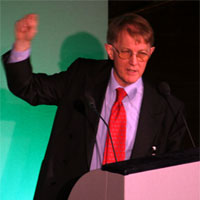
Professor Mike Richards
The first speaker, Professor Mike Richards, National Cancer Director at the Department of Health, confirmed this skin cancer omission to be true.
Professor Richards began his speech by noting the importance of spreading prevention messages in order to quell the rise of new incidences of cancer in the UK, and reduce the one in three people who get cancer and the one in four killed by the disease.
"This conference brings together people from a wide variety of organisations, many with diverse opinions and viewpoints, but all with one common aim - to contribute to the agenda for cancer prevention in the UK," he said.
Mike explained that there was a clear prevention strategy in the UK, based around encouraging a significant reduction in smoking. This would be supported by advocating safe sex to avoid certain infections, explaining the need for five portions of fruit and vegetables per day and advice to practise ’safe sun’. Vast expenditure is planned on advertising and promotion of these issues, with the main focus on cutting smoking.
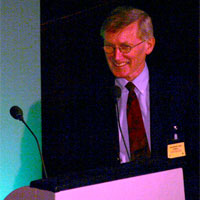
Professor Tony Howell
Professor Tony Howell, Britain’s only cancer prevention professor, based at Christie Hospital in Manchester, presented a speech on the elimination of breast cancer, and focused on the role of endocrinology in preventing, detecting and treating breast cancer - noting that breast cancer is the most common cause of death in young women in the UK.
Tony highlighted the role of oestrogen as ’the baddie’ in breast cancer, noting how prophylactic removal of the ovaries reduces the production of oestrogen and cuts the risk of breast cancer by half. Discussing prevention, he mentioned the important role of mammogram screening, which he claimed was partly responsible for the 30 per cent decline in breast cancer cases since 1990.
Tony went on to discuss a range of drug therapies either currently used in, or being tested for cancer prevention and discussed the importance of lifestyle factors in the prevention of breast cancer. He noted how our bodies were struggling to cope with the rapid decline in physical activity and dietary subsistence, and the increases in processed foods experienced during just 10,000 years as an agricultural society following 100,000 years as hunter-gatherers.
Obesity, he said, doubles the risk of breast cancer, whereas a five per cent reduction in weight at sub-obese levels can reduce the risk by up to 40 per cent. Tony also showed research which demonstrated that, in animals, an intermittent diet similar to that of a hunter gatherer society provided a better outlook for breast cancer than the regular feeding most of us are used to today.
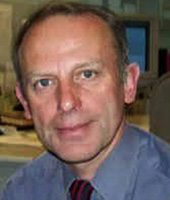
Professor Karol Sikora
Professor Karol Sikora (Professor of Cancer Medicine and honorary Consultant Oncologist at Imperial College School of Medicine) provided a fascinating insight into the near future for cancer. He opened by stating that cancer will not be eliminated in the next 25 or even 50 years, commenting that the current crop of oncologists were trained principally in cancer treatment, whereas future generations’ training will be increasingly holistic.
Karol joked that the countries with the highest prevalence of cancer were also those with the most McDonald’s restaurants - but more seriously, those with the highest proportion of older people. The average age for patients presenting with cancer in the UK is 68, he said.
He went on to describe the four ’strands’ governing the future of cancer: society, finance, technology and delivery.
Society, he said, would play a major role in deciding how much to invest in prevention and treatment. We have important decisions to make as to the value we place on human life.

The average age for patients presenting with cancer in the UK is 68

Karol predicted that current therapy choices - surgery, chemotherapy and radiology - would become more effective, more precise and more likely to be carried out in outpatient clinics, and there would be a dramatic increase in highly targeted molecular therapies. Over 40 cancer drugs for highly specific cases of disease are likely to be licensed on the next 5 - 10 years in the US, although their high cost would raise grave questions about their cost effectiveness, with trial results showing, for example, an average life extension of just 14 days in colorectal cancer patients treated with Avastin, at a cost of 70,000 per patient.
Nevertheless, he said that the future lay in therapies designed for individuals rather than for classes of disease, with drugs being made simpler to administer, preferably orally by patients themselves.
Karol’s belief was that, by 2025, cancer could be ’under control’, rather like diabetes. He thinks we’ll soon be able to identify those at risk of cancer through genetic testing and then provide therapies and drugs to prevent or control it. However he warned that the cost to the health service in terms of staff, services and drugs would be huge.
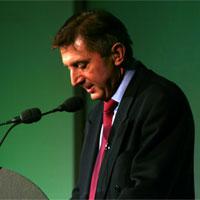
Chris Woollams
Chris Woollams told of at least six or seven ways a cancer might form and how no scientist was absolutely certain that there was a single way of developing cancer. Indeed, "Cancer is probably as individual as you are", said Chris. He then called for a paradigm shift, a huge step-change. ’No one can be absolutely certain that any single factor causes cancer, not even smoking. And if we wait and wait to try and find the next provable cause of cancer we are just wasting time and watching more people develop cancer and die’. Chris wants us to stop talking about ’the cause of cancer’ and instead to talk about ’possible contributing factors’ of which there may well be 20 to 50.
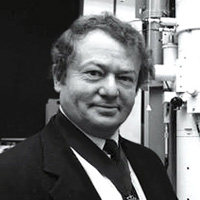
Professor Vyvyan Howard
Professor Vyvyan Howard (Professor of Bioimaging, Centre for Molecular Bioscience, University of Ulster) gave a presentation on the foetal origins of adult cancer, opening his presentation with a description of how various aspects of development in the womb have caused the current cancer epidemic being experienced in the West.
He challenged the assumption that an ageing demographic was an explanation for the increase in cancer incidence, arguing that in fact, our increasing lifespan merely exposes us to cancer-causing agents for longer - and noted how the incidence of cancer was very low in pre-industrial societies. Further evidence of ageing not being the cause of cancer could be seen from the increasing incidence of childhood cancers.
In Vyvyan’s view, there was strong evidence to suggest that exposure to chemicals in the womb could be a major cause of cancer, with studies showing almost universal exposure to harmful, and now-banned organophosphate and organochlorine pesticides among humans.
Chemicals, he said, were highly likely to be the cause of some cancers. Some man made chemicals could interfere with human cell-signalling, others could mimic cancer-causing oestrogen, and there were a great many hormone-disrupting pesticides.

There was strong evidence to suggest that exposure to chemicals in the womb could be a major cause of cancer

Even objects as apparently safe and innocuous as babies’ feeding bottles could, he said, be made from potentially harmful products such as bisphenol A, and many perfumes used on the skin contained hormone-disrupting chemicals. The foetus, he said, was highly sensitive to the disruption caused by such chemicals.
Vyvyan showed how recent advances in our understanding of the role of chemicals in disrupting foetal development meant that we now acknowledged measurements of parts per trillion as potentially hazardous. This change in our understanding of toxicology - from the assumption that only relatively high doses of chemicals could have an effect, to the knowledge that extremely low doses were problematic - represented a ’seismic change’ in understanding.
In summing up, Vyvyan noted how industry-sponsored chemical trials tended to produce much lower negative outcomes in terms of their toxicity, compared to those which were not funded by vested interests.
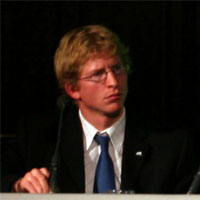
Dr Giles Watson
Dr Giles Watson (Toxics Policy Officer, World Wildlife Fund) was next up and, with CANCERactive research showing great confusion among the public around potentially cancer-causing ingredients in common household products, Giles outlined the achievements to date of the WWF’s Chemicals and Health Campaign and commented on potential carcinogens in common household and cosmetic products.
Of primary concern for the Campaign is lobbying the EU for robust REACH legislation (Registration, Evaluation and Authorisation of Chemicals) that protects the environment and human health, and the phasing out of hazardous chemicals and their substitution with safer alternatives.
Giles noted that there are more than 30,000 chemicals in use in the EU, the majority of which do not have adequate safety data. Robust REACH legislation would require industry to provide safety data. Failure to provide adequate date would offer an opportunity to identify and phase out the worst chemicals in favour of safer alternatives.
Giles described in detail WWF’s Biomonitoring Campaign activity, designed to increase awareness and create pressure for REACH lobbying. Between 2003 and 2005, WWF carried out biomonitoring studies on different groups of volunteers to determine levels of exposure to harmful chemicals in the environment. Groups tested included members of the general public, Members of the European Parliament, UK families, European Ministers and celebrities.

Everone tested was contaminated to a greater or lesser degree

Everone tested was contaminated to a greater or lesser degree, with traces of a wide range of chemicals - including the banned organochlorine pesticides and polychlorinated biphenyls - detected in many volunteers. The 2004 Chemical Check-Up of MEPs yielded the highest level yet reported in a human of one chemical, detected at 10 times higher than levels measured in occupationally exposed volunteers.
In summary Giles said that, although the detection of chemicals in the blood stream does not necessarily imply negative health impacts for the individual, widespread exposure at population level is a cause for concern. He echoed Vyvan Howard’s call for the precautionary principle to be applied.
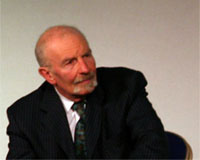
Roger Coghill
Roger Coghill (Founder, Medcross Group) expressed and demonstrated clear concerns about EMF’s (Electro Magnetic Fields) and ELF’s (Extremely Low Frequency radiation), yet more ’possible contributing factors’. Whilst he mentioned mobile phones and brain tumours, and power cables and leukaemias, he also presented research results showing declining lymphocyte and melatonin levels in the presence of mobile phones. Indeed Roger argued strongly in favour of melatonin supplementation. Melatonin is produced in the pineal gland about 90 minutes into your night’s sleep. Research clearly shows that it is an antioxidant and can also neutralise excess oestrogen in the body. Reduced melatonin levels are linked with higher levels of cancer. Melatonin is available over the counter in the USA yet classed as a prescription-only medicine in the UK. Coghill wants it available to everyone as a preventative agent.
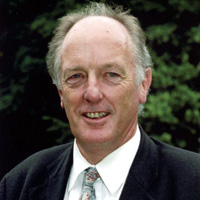
Dr Ian Gibson MP
Dr Ian Gibson MP (member of Parliament for Norwich North and Chair, All Party Parliamentary Group on Cancer) opened his presentation by urging delegates never to stop questioning those in power and to have no respect for them - particularly in the field of cancer!
He summarised the history of the All Party Parliamentary Group on Cancer, which he founded in 1998, a year after election to Parliament, ’to keep cancer on the political agenda, monitor the implementation of Government initiatives, brief MPs and ensure that policy-making is evidence-based and patient-centred’.
Overall, Ian praised the Government’s Cancer Plan 2000 as the first ’comprehensive national cancer plan’, but felt the time was right for a ’Cancer Plan 2’. "There’s an excitement in the air that we can do more," he said. "The time is right, the door is open, and we must haul ourselves up there among the best-performing European countries when it comes to cancer prevention and treatment."
While he said he was pleased that teenage cancers had come on to the political agenda, he was dismayed to hear previous speakers talk of the mere 1 - 2 per cent of cancer budget being spent on preventing disease.
Ian acknowledged Chris’s earlier comments that there was no reason why there has to be one causal agent for all cancers, but said that in his ’lighter moments’ he felt that ’every cancer has a virus attached’.

1 - 2 per cent of cancer budget is being spent on preventing disease

Outlining the priorities for Cancer Plan 2-determined following exhaustive consultation-Ian mentioned the need for long-term funding and immediately increased investment in cancer services to fulfil patient expectations, an emphasis on cancer-related public awareness programmes about diet, melanoma and sexual health and more research into possible environmental carcinogens. Improvements in palliative care were also urgent he said, as was joining up the health and social services.
Dr. Gibson advocated a complete anti-tobacco strategy, and stressed the importance of getting clinical trials run and managed in the UK.
Information provision, he said, needed improvement, together with a crackdown on bad information available via the Internet.
In conclusion, he said the All Party Parliamentary Group would continue to ’make life hell’ for Mike Richards until change was forthcoming.
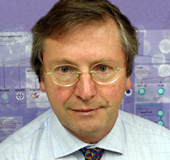
Professor Angus Dalgleish
Professor Angus Dalgleish (Foundation Chair in Oncology, St. George’s Hospital Medical School, Research Director, Onyvax) focused on the extent of infections as a cause for cancer. In the last few years, he said, the importance of infective agents has multiplied, and we now know of six cancer causing viruses, excluding HIV which is not thought to be a direct cause of cancer, but weakens the immune system to such an extent that cancer is frequently a symptom of infection.
Hepatitis B he said, was implicated in liver cancer and very common in Asia, despite the fact that an effective vaccine against the virus exists. Hepatitis C showed a similar disease progression to Hepatitis B although there was currently no vaccine due to the variability of the virus.
Some of the Herpes Viruses were also oncogenic, Angus said. Epstein-Barr virus, for example, causes many cases of nasopharyngeal cancer, particularly in Asia where the accompanying presence of much salted fish in the diet causes the otherwise non-oncogenic Epstein-Barr virus to become cancer-causing.
Burkitt’s Lymphoma too was associated with Epstein Barr virus when the virus was combined with malaria.
Angus went on to outline the role in other viruses such as HHV-8 (the cause of Kaposi’s Sarcoma and Castleman’s Disease), as well as the Human Papilloma Virus, responsible for cervical cancers despite the presence of an effective vaccine.

Hepatitis B was implicated in liver cancer and very common in
Asia

According to Angus, it used to be assumed that retroviruses only caused cancers in animals, and not humans, but more recent thinking has established a firm foundation for the belief that retroviruses could in fact activate cancerous cells in humans.
Indeed, in his view, infection from viruses as a cause of all manner of cancers is a very real concern; far more than Mike Richards had indicated.
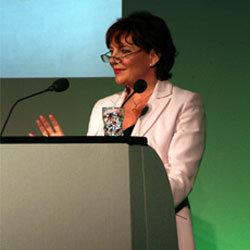
Dr Rosy Daniel
Dr Rosy Daniel (Integrated Medicine Consultant and Medical Director of Health Creation) concentrated on the role of food and optimum nutrition in cancer prevention.
She opened with statistics showing the harmful effects of saturated fats, with women who consume 90 grams of saturated fats each day being at twice the risk of breast cancer as those consuming 40 grams.
Saturated fats, she said, were also highly pro-inflammatory, a hazard given the implication of tissue inflammation in many cancers. Saturated fats are also perfect reservoirs for any toxins in the food chain, as well as producing potentially harmful hormones. Meat, she claimed, was the ’hidden secret’ of cancer, and advocated, where possible, a vegetarian diet, showing evidence to suggest that vegetarians are 40 per cent less likely to die of cancer than meat-eaters.
Rosy drew delegates’ attention to the paradox of the Government’s ’5-A-Day’ programme. Although she recognised the potential benefits of a diet rich in fruit and vegetables, she stated that the details were critical, recalling her days as a medical student, working at a lettuce farm where the crops were sprayed up to seven times. Those concerned about minimising their dietary cancer risk should ideally consume only fresh, organic, pesticide free, local produce, she advised.

Research showed a 34 per cent increase in prostate cancer incidence among milk-drinking
men

She also advocated eating plenty of whole foods containing non-glycaemic sugars to feed healthy intestinal bacteria, vitamins B and K, and the short-chain fatty acids so important for detoxifying the bowel.
Selenium and zinc, she said, were vital minerals. Rosy stated that milk should be avoided - citing research that showed a 34 per cent increase in prostate cancer incidence among milk-drinking men. She believed that ’official’ estimates of the required daily calorific intake for men and women were based on ’earlier times’ when most people led much less sedentary lifestyles; she suggested 1,600 calories as a reasonable daily intake.
Addressing concerns as to the nutritional viability of consuming only 1,600 calories a day, Rosy pressed the case for supplements, and noted how exercising has been shown to reduce the risk of breast cancer by 30 per cent.
She illustrated her concerns over the ’official’ UK position on food and cancer by describing a straw poll she had undertaken, contacting Cancer Research UK, the Food Standards Agency and the Department of Health for their nutritional advice. Rather than provide a clear position, all three organisations suggested she contact the others.

There areseveral obstacles in the way of clear and sensible policies on nutrition in relation to cancer risk

Rosy felt there were several obstacles in the way of clear and sensible policies on nutrition in relation to cancer risk. First and foremost came the vested interests of the food industry, followed by Government ’short-termism’ and a sense of ’passivity’ from the medical orthodoxy whose focus on treatment and research at the expense of prevention, she felt, was flawed.
In terms of possible solutions to the problems of poor nutrition, Rosy advocated putting selenium in agricultural soil at the cost of just 6 per acre, and shifting health promotion away from its ’nannying’ stance towards health creation and health coaching that showed people the benefits of good health rather than just the negative aspects of poor health.
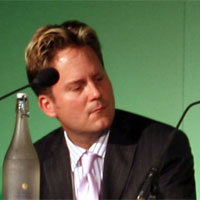
Dr Robert Verkerk
Dr Robert Verkerk (Founder, Executive & Scientific Director, the Alliance for Natural Health) started his presentation with an outline of the aims and objectives of the Alliance for Natural Health (ANH), a pan-European and international, non-partisan, not-for-profit campaign organisation. Rob founded ANH in 2002, initially to mount a professional scientific, legal, media and public affairs-led campaign against the passage of the EU Food Supplements Directive.
ANH, Rob explained, was dedicated to positively shaping the regulatory environment to allow the future development of natural and sustainable health care where individuals were empowered to look after themselves, with access to a wide range of high quality, scientifically proven natural health products.
Following this introduction, Rob congratulated Chris Woollams for pulling together representatives from so many different and disparate organisations to participate in the day’s activities.
Rob voiced the fear that Government and ’big business’ were effectively attempting to divest individuals of their ability to look after their own health, while at the same time being seen to encourage self-caring behaviour. He named three key pressures that are working against the development of natural health as a mainstay in health care: a complex of EU directives and regulations that could significantly reduce access to innovative natural health products; the development of restrictive and unscientific international guidelines on food supplements and other natural products; and a concerted anti natural health bias in the media.
His organisation hoped to protect the ’treasure chest’ of unpatented health care agents that nature offers us to help prevent disease. ’After all,’ he said, ’the NHS would go bust trying to supply patented medicines to prevent ill health.’
Rob commented that, with our current vitamin and mineral deficiencies, the world was in great danger of a return to high incidences of infectious diseases due to our systems becoming immuno-compromised. Prevention, he said, was the single most effective mechanism for reducing disease incidence and cost of care and treatment for the ’big 5’ killers.

We should avoid synthetic vitamins, and take natural ones to replace the shortfall in our supermarket foods

Rob mentioned the growing body of scientific evidence that micronutritional deficiencies were responsible for a large number of the degenerative diseases, such as cancer, heart diseases, diabetes and Alzheimer’s disease, which are becoming increasingly common in western societies. ’Supplementation, natural supplementation’, said Verkerk. His clear message was that we should avoid synthetic vitamins, and take natural ones to replace the shortfall in our supermarket foods.
He also commented that various scientific studies, have shown the difficulty in obtaining sufficient nutrients required for a healthy body from the diet alone. Fruit and vegetable intake, he said, was on average 50% below recommended levels, and felt that the Government’s 5-a-day campaign was too conservative. Some US studies, he said, had made a good case for a minimum requirement of 9 portions of fruit and vegetables to have a positive impact on the outlook for prostate cancer.
In summing up, Rob called for the Government to pay close attention to the health benefits of three supplements in particular: mixed carotenoids, mixed locophenols and locotrienols and salvestrols, and made the point that by transforming all possible supplements into synthesized medicines, we could be at risk of denying ourselves the ability to use nature’s bounty in preventing disease.
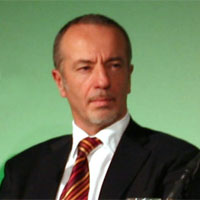
Dr Damien Downing
Dr Damien Downing (Specialist in Ecological Medicine) - spoke of the critical importance of naturally occurring Vitamin D as the most important cancer prevention agent.
He opened by criticising the anti-sun lobby who advocate complete sun avoidance to reduce the risk of skin cancer, claiming that in doing so, individuals are likely to be at greatly increased risk of developing other forms of cancer.
Damien explained that sunshine was actually good for you and showed maps of lowered cancer levels clearly linked to good sunshine levels. Apparently sunshine makes vitamin D from the cholesterol layers under our skin and cancer cells have lots of receptors for the vitamin. It can kill them and it can repair broken DNA strands; Dr Downing feels it is the ultimate cancer preventer and recommended we all supplemented with natural vitamin D.
Damien said he felt justified in stating that Vitamin D could help prevent up to 60% of cancers, but that manufactured vitamin D ’analogues’ are inferior in quality to the real thing.
In summary, Damian felt vitamin D was overlooked because, as a naturally occurring phenomenon, it wasn’t profitable for the pharmaceutical industry, and that the public had been erroneously indoctrinated into a culture of fear about sunburn, skin cancer and premature ageing. This, together with a lack of good research in the area was putting us all at an unnecessarily increased risk of cancers due to sun avoidance.
At the conclusion of the conference, Dr. Ian Gibson commented that "if all the organisations represented here today were to come together and ’hunt in a pack’, rather than as individual groups, the increased effect on politicians could be phenomenal".
Well - watch this space - they plan to do just that!!
Notes To Editors
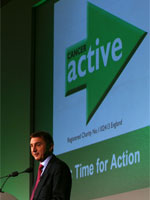
Founded in 2004, CANCERactive believes in simple, relevant, easy to use information on cancer prevention and how to beat cancer.
Believing that prevention is better than cure - the charity aims to more effectively educate people on the possible preventable risks and causes, so that they can make more-informed personal choices and thus reduce their risks of dying from this terrible disease. It does this by making information on cancer prevention both accessible and understandable, and explaining how simple, easy changes to people’s lifestyles and diet can make a significant difference.
CANCERactive base it messages around what it terms "The Four Pillars of Cancer" - diet, infection, toxins and mental state, believing that only by looking at all four areas can cancer be properly prevented.
CANCERactive also provides a platform of support for those who have cancer, offering comprehensive advice on how to treat their disease using an integrated approach. New easy to use website - it provides comprehensive information about key triggers of cancer and easy steps that can be taken to avoid these triggers. The website can be found at www.canceractive.com. A series of downloadable leaflets entitled ’Why take the Risk?’ will shortly be available.
icon magazine - CANCERactive’s magazine is distributed free to 150 hospitals every issue, with an estimated and rapidly growing readership of over 600,000 readers per year. The magazine contains honest and accessible advice on combating cancer. The information is provided in a user-friendly and non-medical way, and includes up to date cancer treatment information from around the world, (www.iconmag.co.uk or www.canceractive.com).
Speaking tour
In the last 12 months, Chris Woollams the founder of CANCERactive has been conducting a speaking tour covering the charity’s cancer prevention messages, speaking at 55 events worldwide and talking to nearly 45,000 people. The talks have also raised over 75,000 in donations and sponsorship.
Literature
CANCERactive’s research on effective cancer prevention and the possible causes of the disease have been formed into the best selling book "Everything you need to know to help you beat cancer". This has become Britain’s fastest selling cancer book in the last two years, selling over 23,000 copies. It is supported by "The Tree of Life - The Anti-Cancer Diet" and "Oestrogen: the Killer in our midst."
CANCERactive is a registered charity. No. 1102413
For further information, please contact:
Lindsey Fealey
Chief Executive
CANCERactive
The Elms
Radclive Road
Gawcott
Bucks MK18 4JB
t. 01280 821211
f. 01280 824655
e. lindsey@canceractive.com
w. www.canceractive.com